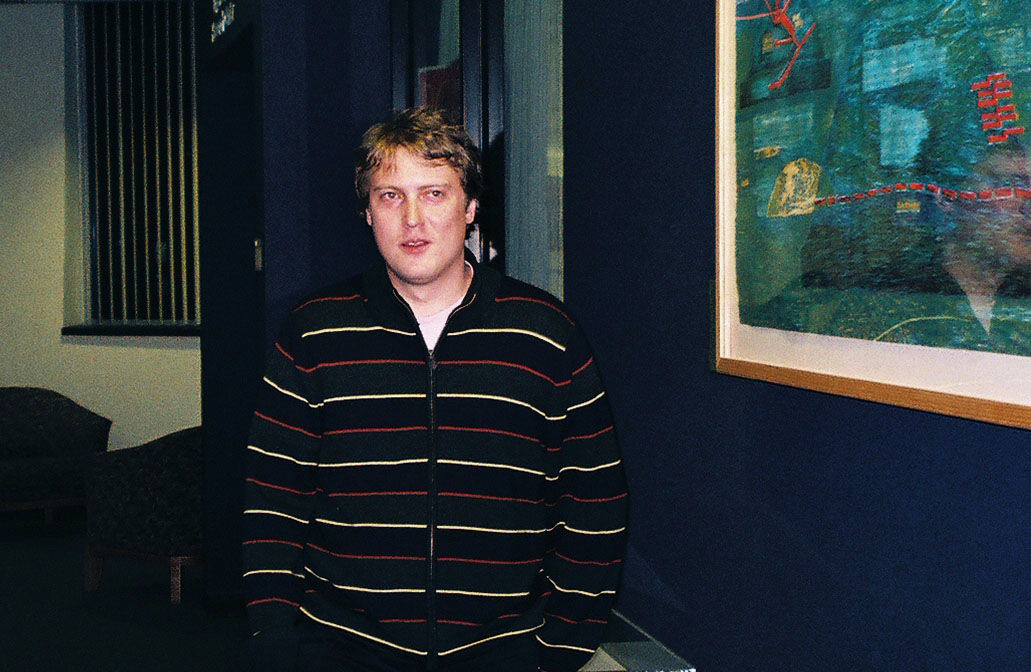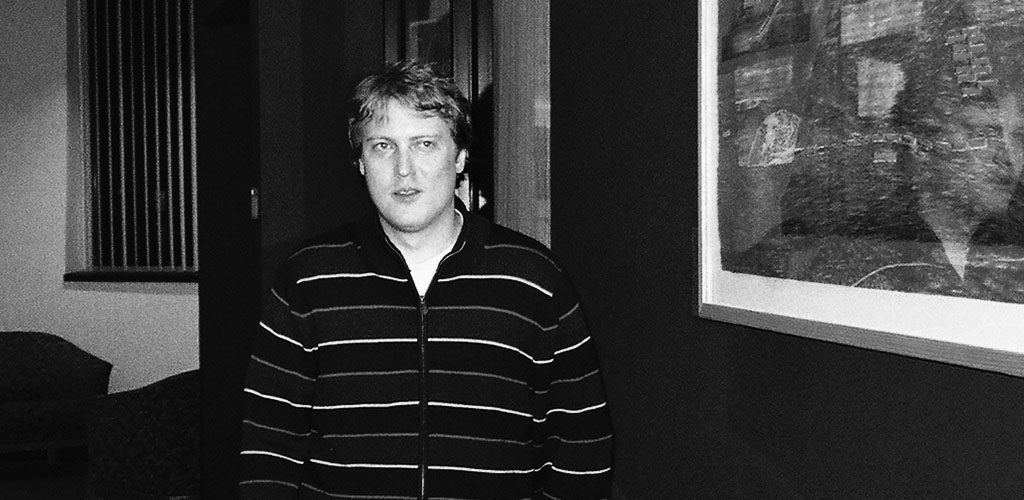
Recently, I snuck into the back of a classroom in the Rutgers University library in New Brunswick, New Jersey to see Joe Steinhardt, founder of Don Giovanni Records, in a panel discussion celebrating the library’s soon-to-be New Brunswick Music Scene Archive.
The event was loosely run by two adorable library representatives who had no idea that the night would include a warm audience reception to the idea of a record sold with sandpaper on the inside to instantly destroy it and the fetishism associated with it, a somewhat tense discussion of the exclusivity of the archive and the hardcore scene itself, and Screaming Females lead singer and guitarist Marissa Paternoster proclaiming, “Rutgers hates art.” Joe stood out that night amidst the hilarity and weirdness, steering the conversation always to the importance of independence and actively working to make your scene more inclusive—values that Joe lives and stays true to like a total babe.
While that was the first night we met face-to-face, Joe and I first spoke during a phone interview for a feature story I was writing on Screaming Females for Impose. All I needed were a few quotes from the band’s label head on the eve of their latest release, but what I got from Joe was so much better. We spent over an hour talking about his friendship with the Screaming Females, and how friendship and admiration was the basis of his label. (Joe doesn’t earn his living off of Don Giovanni, instead making his money from academia.) We talked about how the mainstream music industry oppresses artists and creates false narratives of success, and Joe passionately explained the need for bands and the community around them to operate independent of the established system and support each other. Let’s hear it again: babe!
Joe created Don Giovanni Records to document, share, and support his local music community in New Brunswick—a scene that grew up in the empty space around Rutgers, relying on basement shows with “ask a punk” security to fill in the gaps of a community with no all-ages venues. He was just eighteen years old, hoping to put out his own record, when it all began. Now, Don Giovanni is well-known outside of New Jersey, for its values as much as for the caliber of its artists, whose home towns have also expanded outside of the Garden State.
Joe, too, has left New Jersey for Ithaca, although Don Giovanni remains a New Jersey-based label. In Ithaca, he recently completed a PhD in Communication, specifically studying health and risk communication, and is currently a research associate studying decisions about tobacco use in low-income populations. “I have this whole other life. It’s kind of weird. Neither life is that interested in the other,” Joe tells us with a laugh.
Read on to learn more about Don Giovanni, the necessity of an independent music community, staying true to your values, how Joe defines success, and yes…a bit about risk and communication, too. And because we love all you babes so much, enjoy some great tunes from Don Giovanni artists below!
What made you decide to start a record label?
I never had a coherent plan to get a label together. I had always wanted to put out my own band’s record, which is what I started with—a 7” of my band at the time—and that was all I really wanted to do. Then it slowly—really slowly—got to where it is now.
It really came out of necessity. When we started, it was mostly with bands that couldn’t even find a label, but they were good. So it started out of necessity for my band and continued out of necessity…which is still how it feels now. It’s not really something that I saw myself doing. It’s just that someone had to do it.
When we talked for the Impose feature, you said Screaming Females played a big role in growing Don Giovanni. Tell us a bit about how you guys got together and how you helped each other.
New Jersey, especially New Brunswick, is small. Everyone knows all the bands. I was going to shows, and Screaming Females were just around. I didn’t approach them ever as a label. It was more, “I admire what you’re doing. Let’s be friends.”
They self-released their first two records, and we were thinking about working together for their next record. They went on a tour, and at the end of the tour, I drove down to D.C. to see them, and they told me that they had decided to self-release their third record. At first, I was like, “Okay, cool. Self-releasing is really great, and maybe we can still help out somehow.” We were hanging out after the show, and I was thinking about it more and more. I realized that we had to do this record. I was like, “I’m going to kill myself if you don’t let me do this record.” [Laughs] “You have to let me do it!”
That night, [Screaming Females’ drummer] Jarrett Dougherty and I stayed up late to make a plan that they could compare to self-releasing. Because the truth is that I didn’t have a plan. All we did back then was just press records. So I was basically just bullshitting, like, “Oh, we’ll get a publicist and do radio. We’ll figure out what real labels do, and we’ll do it for your record. We can do it, trust me.” After they decided to do it, I had to figure out how to make all those empty promises full.
Now here we are about eight years later, and we did fulfill all those promises. They are a real band, and we are a real label. We did that with them. We built the label together by figuring out all these things that we didn’t know how to do. And now we have this sort of template that we’ve built for other bands. We’ve grown together, and it’s been really beautiful. I’m really proud of them and everything we’ve accomplished together.
What was the New Brunswick scene like when you first became a part of it? How has it transformed?
I first started going to New Brunswick for shows my freshman year of high school. It was this magical place to me that I romanticized in my head and maybe still do to some extent.
The scene is so tied to Rutgers students that it has ebbed and flowed many times over the years as students graduate and bands break up and people move out of the city, and then a whole new crop comes in.
The city itself, though, seems to be going through a kind of scary transformation right now as far as I’m concerned. I’m worried it’s going to push some of the more fringe culture out as it tries to be more “upscale.” Luxury condos and more expensive food options seem to be springing up in places you would never expect. We’ll have to see what that does to makeup of the city, but I worry it’s going to drive some of the more interesting people out as they won’t be able to afford to live there anymore.
You now work with bands from outside of New Jersey. When you think about why Don Giovanni is a necessity today, does it go beyond supporting that local community?
The main focus is always going to be New Jersey, but it’s expanded to where it’s just like-minded bands. It was never just “bands in New Jersey” as the criteria for who we wanted to work with. It was bands in New Jersey that share our DIY punk values. Recently, the values have become more important.
I’m still trying to document a scene, but the scene has become less regional and more about, politically speaking, “What side of the line are you on?” If you’re on our side, I want to be helping and standing next to you. And if you’re on the other side, I don’t care about you. Even if you’re from New Jersey, I don’t care.
What does your side of that line look like? Why do you think it’s worth fighting for?
While DIY is often a more personal definition, the meaning of “independent” is very clearly defined: you are operating outside of the three major labels that control the entire infrastructure of the music industry and work to push anyone who isn’t benefiting them out. These are ugly companies with abusive agendas towards artists and consumers.
One of the most disappointing things that has happened in recent years is that these major labels are attempting make the definition of “independent” fuzzy in ways that give them even more control over the industry. You see the term “independent” applied to all kinds of artists and labels who are completely dependent on the big three labels for distribution and radio promotion, which are key to the kind of success that major labels have forcefully shut everyone else out of.
It is worth fighting to remain independent because these major labels don’t actually care about music or culture at all. There needs to be an alternative for artists and consumers, and the independent music community provides one.
Is it frustrating working in the independent community, with all of these misconceptions about the music industry flying around?
Sometimes I’ll read things like, “This band deserves to have their songs in TV commercials,” or “When is band X going to get this?” whatever that may be. The truth is that bands that operate outside of the major labels will never get most of those things. They won’t ever be on SNL because an independent band has never been on SNL. People ask, “Why isn’t this band on the radio?” The bands we work with are cut out—and are choosing to be cut out—just because we’re operating in a way that we think is ethically responsible.
Also, anyone that thinks buzz or hype can kill a DIY band by making them “too big” doesn’t understand how it all really works. Bands only get too big when they strategically decide to get too big (not to say it always works)…when they hire management and lawyers and other middlemen you wouldn’t even believe exist if I tried to tell you. I don’t really judge what artists do as good or bad, but these false narratives about how the music industry “works” are poisonous. Especially to young artists and listeners who don’t know how it really works. Bands don’t blow up out of DIY because the basement shows get too big. That’s just the story. They get big because they sign contracts with major labels and management and lawyers. I’ve been to DIY shows with bands that sold twice as many records as their major label counterparts. The narratives about accidental overnight growth are just fucking bullshit.
A band has to consciously decide to do that. Our bands decide not to. These are conscious decisions they’ve made to stay close to their fans and do what they’re doing on their own terms.
Can you describe your approach to working with artists on your label?
As a label, we work with people. So if I’ll support anything that people I believe in are doing. I want to just help them do it.
For example, we’ve helped put out art books for Marissa Paternoster from Screaming Females. We did a book of Lauren Denitzio’s art, too. She’s in Worriers, another band we work with. We’ve also published two novels and two illustration books from people connected with our label. Basically, anyone in our label family, if they want to write a book or, like Shellshag, make a weird web TV show series, or if Chris Gethard wants to make a comedy record…it’s like, sure, we’ll figure it out.
The label is very much based on love and friendship, not money and power. I make my money from academia. Money is not a part of what drives any of this stuff. Instead, what we’re trying to do is see how big we can get this without compromising our values.
How have the people you worked with inspired you?
The bands and people I work with have really shaped how I think about the entire world. They challenge me constantly by offering new perspectives on personal politics and label politics that I would never really encounter otherwise. We all learn a lot from each other, which is one of the biggest benefits of working with a community of artists the way we do. Everyone supports each other and everyone helps and teaches each other. I often have the most to learn.
Was there ever a point where you thought you’d have to close shop or it wouldn’t work? How did you get over that moment of doubt?
Constantly. The only real way to grow is to always be pushing yourself a little bit ahead of where you are. I think the trick is not pushing yourself too far ahead at once, but there is always that fear that you might have.
What have you learned from your PhD studies about making complicated, risky decisions? What are your recommendations for fuck-ups like me?
For starters, that you’re probably not a fuck up! One of the biggest takeaways from my studies is that people tend to make risky choices for all kinds of different reasons. It’s really easy to look at a decision someone made that would be a bad decision for you and think it’s a bad decision for them, but it’s rarely that simple. However, problems do arise when people don’t fully understand the choices they are making because they don’t understand the risks, or are biased by their emotions. This is where communication comes in, and my view of good risk communication is when people are given the information they need to make informed decisions. Others in the field, though, may disagree and believe the goal is to persuade people to make healthy decisions.
How do you define success, and do think you have achieved it?
I have learned to define success by longevity, or as Peter Stampfel would put it, “perseverance.” Being able to keep doing this label and being able to work with bands for so long without having to compromise any of my values is something I’m extremely proud of. The most successful people I know are the ones who have been able to do things they are proud of for the longest, not the ones who get the most attention for whatever they’re doing.
Keep up with Don Giovanni Records via the label’s website, Facebook, Twitter, and Instagram.



No Comments